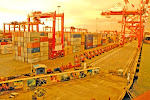Sri Lanka’s budget deficit has expanded by 50.8 percent with government expenditure rising at a faster rate than revenues while the annualised budget deficit as a percentage of GDP has reached 8.4 percent, latest data from the Central Bank shows.
According to the revised 2009 Budget, the deficit for the entire year was estimated at Rs. 346.4 billion but the actual difference between government spending and revenues had already exceeded this full year target, reaching Rs. 416.4 billion by October.
According to data released by the Central Bank last Friday, the budget deficit for the first ten months of 2009 amounted to Rs. 416.4 billion, a 50.8 percent increase from a deficit of Rs. 276.1 billion for the corresponding period of 2008.
During this period, total expenditure of the government increased by 24.93 percent to Rs. 992.2 billion from Rs. 794.2 billion during the corresponding ten months of 2008.
Current expenditure, accounting for 75 percent of total expenditure, increased by 27.06 percent to Rs. 749.4 billion from Rs. 589.8 billion while capital expenditure increased by 18.73 percent to Rs. 242.7 billion from Rs. 204.4 billion.
Total revenue increased by 11.3 percent to Rs. 575.8 billion from Rs. 518.1 billion. Tax revenue, accounting for 88 percent of total revenue, increased by 8.4 percent to Rs. 506.1 billion from Rs. 468 billion while non-tax revenues increased by 39.2 percent to Rs. 69.7 billion from Rs. 50.1 billion.
According to the 2009 budget, revenues were estimated at Rs. 855 billion and later revised downward to Rs. 727.7 billion and so far 79 percent has come into government coffers for the first ten months. Expenditure was estimated at Rs. 1,191.7 and subsequently revised down to Rs. 1,074.1 billion, 92 percent already being accounted for by October.
Economists argue that it would be difficult for the government to meet the budget deficit target of 7 percent of GDP for 2009 as laid out in the agreement with the IMF. The targets for 2010 and 2011 are 6.5 percent and 5 percent respectively.
According to data presented in the Central Bank’s Recent Economic Developments: Highlights of 2009 and Prospects for 2010, the estimated budget deficit for 2009 is Rs. 346.4 billion (revenue Rs. 727.7 billion minus expenditure Rs. 1074.1 billion).
The revised budget deficit as a percentage of GDP for 2009 is estimated at 7 percent. Using this figure we could estimate the nominal value of GDP for 2009 which works out to Rs. 4,948 billion (deficit Rs. 346.4 divided by 7 and multiplied by 100).
The annualised deficit as a percentage of GDP for the first ten months of 2009, therefore, works out to 8.41 percent of GDP.
The Central Bank over the past few months has warned the government against reckless spending and increasing public sector wages which threatens the low inflation and low interest rate environment of the country and the ability of the private sector to grow and contribute to the country’s productivity and employment generation.




.jpg)






